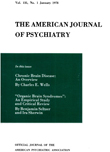A Reevaluation of "Psychiatric Help" When Divorce Impends
Abstract
Psychotherapeutic intervention on one side or another in a marriage when divorce is being considered may serve to destroy the possibility of reconciliation. Despite the therapist's efforts to remain neutral, he inevitably finds himself thrust into the role of catalyst, judge, or "alternate mate." The authors suggest the inclusion of both partners, as well as children and perhaps other family members, in the therapeutic situation as one means of avoiding an outcome that may ultimately prove detrimental to all.
Access content
To read the fulltext, please use one of the options below to sign in or purchase access.- Personal login
- Institutional Login
- Sign in via OpenAthens
- Register for access
-
Please login/register if you wish to pair your device and check access availability.
Not a subscriber?
PsychiatryOnline subscription options offer access to the DSM-5 library, books, journals, CME, and patient resources. This all-in-one virtual library provides psychiatrists and mental health professionals with key resources for diagnosis, treatment, research, and professional development.
Need more help? PsychiatryOnline Customer Service may be reached by emailing [email protected] or by calling 800-368-5777 (in the U.S.) or 703-907-7322 (outside the U.S.).



